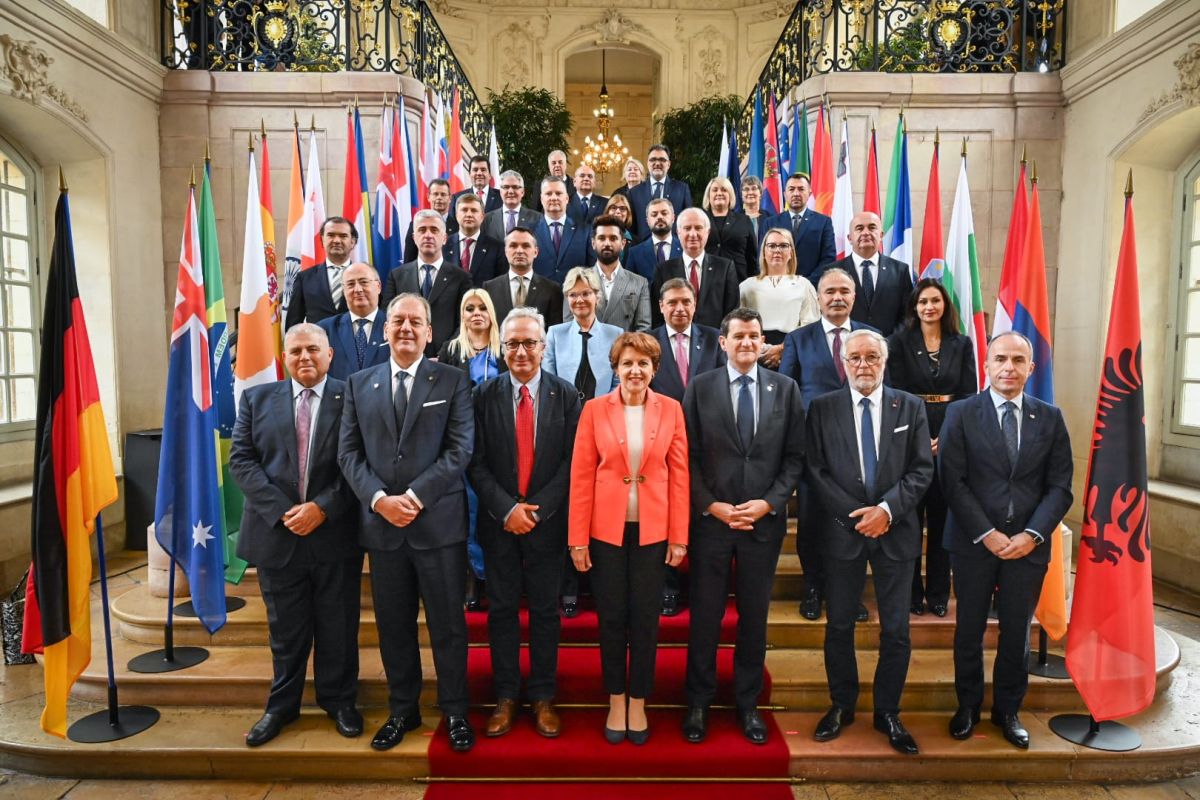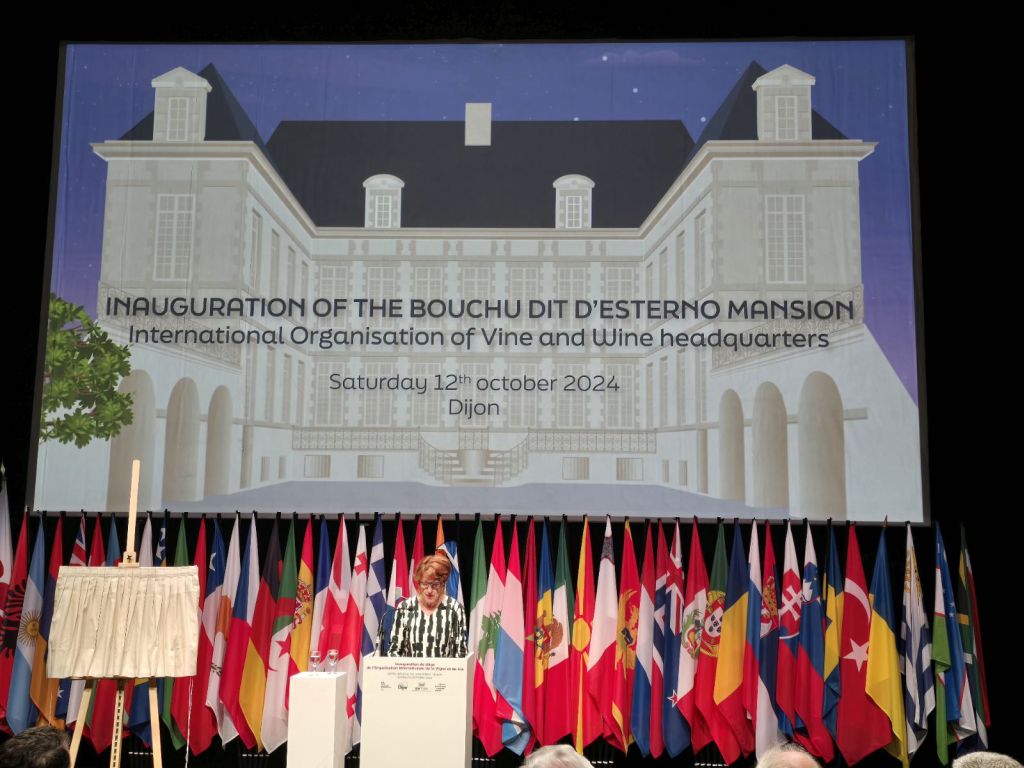A three-day ministerial conference was held in Dijon at the initiative of the French Minister of Agriculture and Food Sovereignty to mark 100 years since the establishment of the International Organisation of Vine and Wine (OIV) and in anticipation of the 45th World Congress of Vine and Wine, with a delegation from Serbia, an OIV member, taking part, the Ministry of Agriculture, Forestry and Water Management said.
- Serbia
Get to know Serbia
- Citizens
Culture and science
Health services
Pension and disability insurance
- Business
Employment
Economy
- Media
- Government
- Contact
Keep in touch
Keepin touch
Whether you have a question, comment, suggestion or any problem in the purview of the government, send us your message and we will try to respond as soon as possible. If your problem is not in our purview, we will forward your message to the relevant institution.
Serbia dedicated to development of vine and wine sector
Members of the delegation included State Secretary at the Ministry of Agriculture, Forestry and Water Management Livija Pavićević and Assistant Minister for International Cooperation and European Integration Anja Javor.
Pavićević emphasised that the Republic of Serbia remains unwaveringly committed to the mission of the OIV, which was founded in 1924 as a technical and scientific intergovernmental organisation and today stands as a key player in the global wine sector.
She recalled that a century ago, visionaries from all corners of the world gathered in Paris to establish this important global forum, which transcends borders, languages, and cultures. Their far-reaching vision laid the foundation for the harmonisation of standards, the promotion of sustainable practices and the elevation of wine as a cultural treasure while nurturing international cooperation, Pavićević said.
Today we stand on the threshold of a new era, marked by digital transformation and climate change, which will shape the future of wine and viticulture, Pavićević stated, noting that it is essential that Serbia’s wine sector adapts to these changes and that the OIV continues to play a crucial role in achieving consensus among member states, ensuring sustainable wine production and trade.
According to her, through the resolutions of this international organisation, best practices are developed that directly impact the quality of Serbia’s final products and their sales on the global market.
Serbia, with its rich heritage in viticulture, has been and remains an active participant in this collective effort, Pavićević said, noting that the state is ready to contribute, share its experiences, learn from others and once again reaffirm its commitment to the core principles of the OIV, which are reflected in unity in diversity, sustainability, quality and authenticity.
Dijon-based OIV currently gathers 50 member states, representing 75% of the world’s vineyards, 37% of global table grape production, 50% of dried grape production, 88% of wine production, and 71% of wine consumption worldwide.
The OIV provides grape- and wine-producing and consuming countries with essential information for drafting regulations, minimising trade barriers, promoting sustainable production and protecting consumers. The main function of this international organisation is to establish standards for the viticulture and wine sector.
In celebration of its 100th anniversary, the OIV has symbolically declared 2024 as the International Year of Vine and Wine, with the aim of stimulating and promoting scientific, technical and cultural meetings and discussions in all wine-producing countries under the theme “The Vine and Wine of Tomorrow”.
On the sidelines of this year’s ministerial conference in Dijon, the delegation from Serbia met with Minister of Agriculture and Food Sovereignty of the Republic of France Annie Genevard.
Several days prior to the conference, the text of the Ministerial Declaration on the centenary of the OIV was agreed upon, with the member states reaffirming their commitment to this intergovernmental scientific and technical organisation and, through it, to the significance of the viticulture and wine sector as a whole. Serbia supported this declaration, the Ministry of Agriculture, Forestry and Water Management noted in its statement.
Photos: Ministry of Agriculture, Forestry and Water Management
-
 Belgrade, 4 February 2026
Belgrade, 4 February 2026Serbia among highest-rated countries in preventing money laundering, terrorist financing
-
 Belgrade/Dubai, 4 February 2026
Belgrade/Dubai, 4 February 2026Cooperation with UAE in development of nuclear energy programme in Serbia
-
 Belgrade/Dubai, 3 February 2026
Belgrade/Dubai, 3 February 2026Connectivity with neighbouring countries in oil, gas sector
-
 Belgrade, 2 February 2026
Belgrade, 2 February 2026Quality cooperation with France in multiple areas of energy sector
-
 Belgrade, 29 January 2026
Belgrade, 29 January 2026More than 500 exhibitors and brands at this year's AgroBelgrade fair
-
 Belgrade, 19 January 2026
Belgrade, 19 January 2026Deal reached on key provisions of NIS sale and purchase agreement
-
 Belgrade, 16 January 2026
Belgrade, 16 January 2026More than one-third of Growth Plan funds directed to energy sector
-
 Belgrade, 15 January 2026
Belgrade, 15 January 2026Goal to finalise NIS negotiations by end of week
-
 Belgrade, 23 December 2025
Belgrade, 23 December 2025Enhancing implementation of IPARD III programme
-
 Belgrade, 12 December 2025
Belgrade, 12 December 2025Construction of gas interconnector with North Macedonia by end-2027



